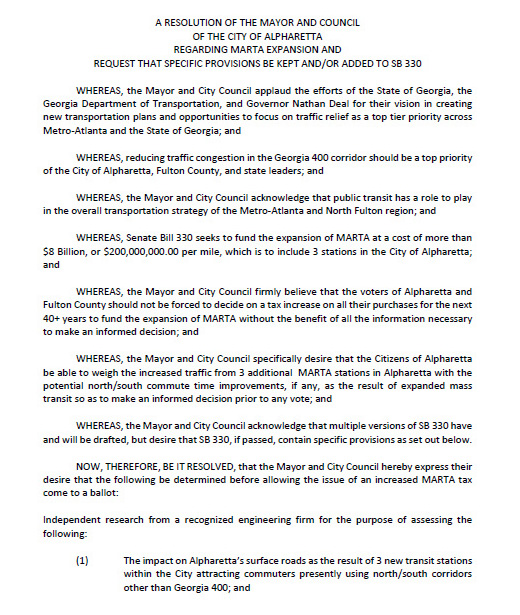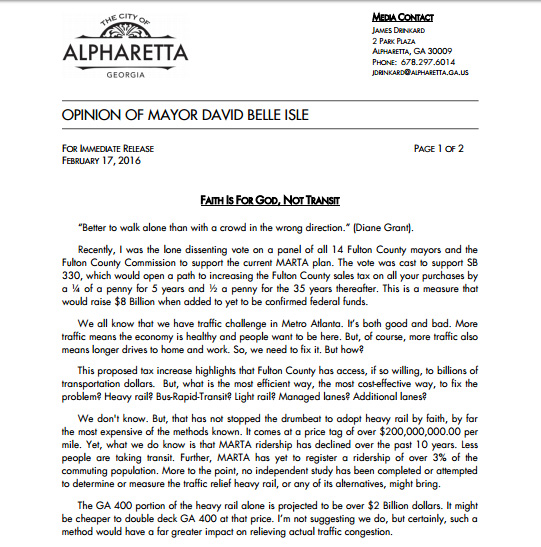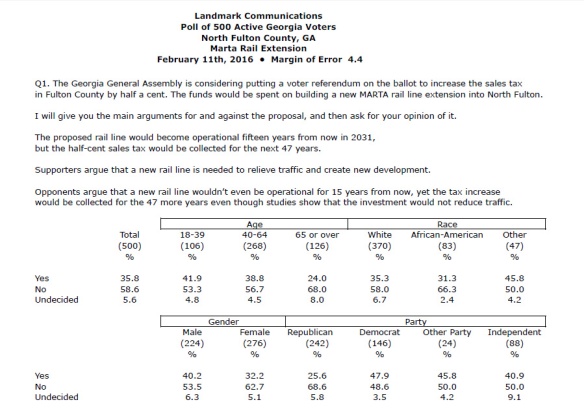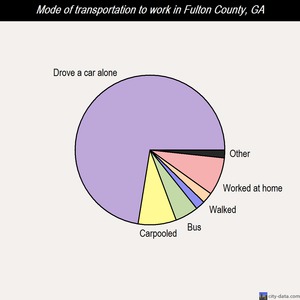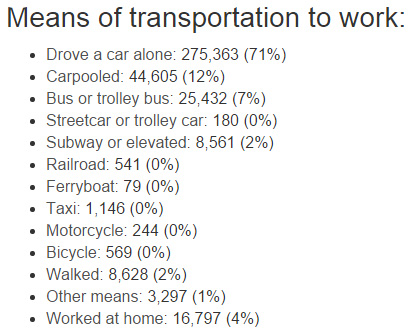The article below was written by Mayor David Belle Isle, the mayor of Alpharetta, who gave me permission to share it with you here.
Is The Current MARTA Vision Worth The Chase?
I’m a vision guy. I love looking at something and imagining what it could be; what it could be like; and how to get there. I love chasing a vision and seeing the pieces fall into place. But, for a vision to be worth the chase, the promise of “what could be” has to be better than “what is.”
Last week, I found myself in a makeshift room midway up the interior back stairs of the State Capitol. The room was packed. The air was hot. I was there to testify on behalf of Alpharetta at a committee hearing on the proposed MARTA expansion bill, SB 330. To my surprise, the room was not full of concerned every day citizens seeking faster commute times to home and work. Rather, it was filled with developers, lobbyists, and employees of chamber and public policy groups. Indeed, a total of 7 lobbying firms have been retained to make sure this MARTA bill gets passed and that you vote for it. Big money. Big stakes. Big supporters.
Among others, two developers spoke of how wonderful the MARTA expansion would be for the economy, specifically their economy. They introduced a new phrase: “transit premium.” This is the concept by which the properties serviced by the rail will increase in value by 50%. This is fantastic! Fantastic, that is, if you’re a property owner or developer near a proposed new transit station.
On the whole, I firmly believe that the expansion of public transit is part of the solution as we look to shorten our drive times to home and to work. But, the current $8 Billion proposal has me scratching my head:
- What About the 97%ers? Only 3% of commuters within reach of the current rail use MARTA and ridership is down over the past 10 years.
- Convenience Factor. For most, using rail involves a six-part process: a drive to the station, a wait for the train, a ride on the rail, a wait for a bus, a ride to a bus stop, and a walk to their building. Real people will weigh that time and hassle against driving straight to work.
- Transit for Everyone… Else. Many who support the expansion of MARTA rail are laboring under the hope that others will take the train so that their drive downtown won’t take so long.
- Until Death Do It Tax. 43 years is a long time to pay a tax on everything you purchase. This puts the full payment outside my life expectancy. I’m 40.
- Bait and Switch. The MARTA project list is disposable. MARTA is not obligated to build the projects the voters are being asked to fund. They should be.
- Hadn’t Thought of That. No one has thought to measure the expected improvement, if any, along Georgia 400. For an informed vote, we need to know how much quicker our drives will be.
- Federal Match? The proposed expansion is dependent on federal matching funds of $4 Billion. There is no obligation by the Fed to commit these funds. Before MARTA expansion hits a ballot, there should be.
- I’m Against What? The ballot question is worded in a way that a “No” vote implies you oppose traffic relief and economic development. The question should be neutral.
- Stacked Deck for Alpharetta. If successful, 3 new transit stations will attract 3 new streams of traffic from surrounding areas and require 3 new 2,500-car parking decks constructed MARTA-style.
I truly want to see us, as a region, take on traffic and develop a comprehensive plan. I can see it. That’s my vision. It is imprinted on my mind. Yet, we need to look at all the options openly: heavy rail, new roads, light rail, additional lanes, bus-rapid-transit, managed lanes, bus circulator programs, intersection improvements, signal timing, adaptive traffic, Uber, driverless cars. If we’re not careful, we’ll spend more than half of our transportation dollars on 3% of our commuters. “What could be” will be no better than “what is,” except we’ll have the pleasure of paying for “what should never have been.” The best answer probably lies in some combination of travel methods. We don’t know. But before we vote, let’s find out if this vision is worth the chase.

